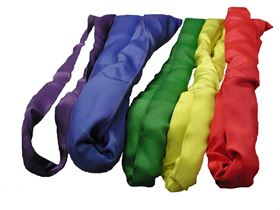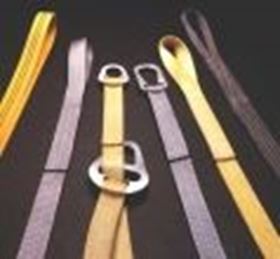Synthetic Slings
Whether you are looking for a flat web sling or a continuous fiber round sling, we offer the full range of types and sizes.
SYNTHETIC WEB SLINGS offer a number of advantages for rigging purposes.
The most commonly used synthetic web slings are made of nylon or polyester.
As is the case with all slings, identification is required for the life of the sling. Our experience in the field performing sling inspections has allowed us to evaluate many different types of web sling tags. We believe ours is the most durable tag available.
Advantages
-
Will adjust to the load contour and tend to hold it with a tight grip
-
Load protection – generally will not mar, deface, or scratch highly polished or delicate surfaces
-
Available in wide widths for improved load control
-
Relatively low initial cost
-
Shock absorbency
-
Red core yarns to assist in the inspection process
Cautions
-
Not to be used at temperatures in excess of 194 F.
-
Susceptible to sharp edges and abrasive surfaces
-
A relatively small amount of damage can cause significant loss in strength
-
The strength of synthetic webbing can be degraded by chemically active environments
(always be certain to consult the manufacturer prior to use.) -
The strength of synthetic web is degraded by exposure to sunlight or ultraviolet light
SYNTHETIC ROUND SLINGS continue to grow in popularity throughout the industry. The varieties of configurations and rated capacities available have made them the sling of choice for many applications.
Advantages
-
Conforms to shape of load to grip securely
-
Load bearing yarns protected from UV degradation
-
Double wall cover for greater sling life
-
Soft cover won’t scratch load surface
-
Light weight reduces ergonomic concerns
-
Color coded capacities for quick identification
-
Relatively low initial cost
-
Shock absorbency
While there are many advantages to choosing a polyester round sling, the user does need to consider the following –
-
Not to be used at temperatures above 194 F.
-
Susceptible to sharp edges
-
The strength of synthetic round slings can be degraded by chemically active environments
(always be certain to consult the manufacturer prior to use.)


